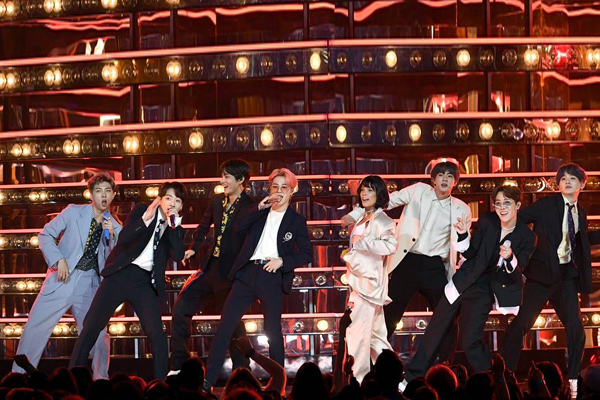MUMBAI: South Korean boy band BTS backstage at the 61st Annual GRAMMY Awards at Staples Center on February 10, 2019 in Los Angeles, California.
Members of popular South Korean “K-Pop” group BTS could each raise up to $ 7.7 million as shareholders when the label that represents them goes public, likely next month.
The seven group members each received 68,385 common shares as a gift from Big Hit Entertainment CEO Bang Si-hyuk, which could mean they will each receive 9.23 billion won of shares (over 7.7 million won). dollars) if the IPO price is set as expected. The prize values Big Hit Entertainment at 4.8 trillion won (over $ 4 billion).
The giveaway from Si-hyuk, who is also Big Hit’s largest shareholder, was intended “to strengthen the long-term partnership with great artists and boost morale,” according to a company regulatory filing.
It is a reminder of how much the music industry has changed with the advent of streaming and social media, which has given artists more control over their own income. However, this type of agreement is still “unprecedented,” according to Jeff Peretz, a professor at New York University and expert in musical copyright. It is also not something that has been seen in other arenas such as cinema, professional sports or professional esport.
“It may be the future – but it’s usually the other way around, where artists will create their own labels that they own and then try to get other artists to sign with them and build,” Peretz said.
He noted that it was a wise move on Big Hit’s part, especially as BTS had achieved international popularity. Last week, BTS took South Korea’s No. 1 spot on the US Billboard Music Chart. It is also only the third group in 50 years to have three number one albums on the Billboard 200 charts in less than 12 months. (The Beatles and the Monkees are the other two groups.)
BTS is also a significant source of revenue for Big Hit, responsible for over 87% of its revenue in the first half of 2020 and over 97% in the first half of 2019.
“Businesses in the industry are trying to lock in any potential revenue stream in a way they never have in the past,” Peretz said. “If BTS is the main source of income, it makes sense to partner them up and never run the risk of them leaving for another label when their deal is done.”
Peretz said the move, while unique, referred to Bowie Bonds, first issued in 1997. Artist David Bowie was able to raise $ 55 million from investors with his back catalog income pledge of 25 albums. Investing in an artist’s catalog is similar to investing in stocks in that the value can fluctuate over time, Peretz said.
There are also instances where management companies and record labels have formed joint ventures with artists, which is an implicit investment, said Errol Kolosine, music director and professor at NYU. He also said there had been instances where some companies were experimenting with profit-sharing arrangements, but he noted that ceding shares in a state-owned company is rare, if not unknown.
“The level at which an individual or two can completely alter the success of a franchise or business is unique in the world of sports and music – but they rarely get capital,” Kolosine said.
He noted that the relationship could have some interesting ramifications for BTS and Big Hit. While the deal will give members some say, none of them own a controlling stake in the company, so their level of contribution might not be that different from what they said – even as the main income generator for the business. .
“If you are responsible for this profit, you probably already have a say, so the deal could create conflicts of interest over time. But it also produces opportunities,” Kolosine said. “For example, if you are used to being the king of the castle and another artist starts to gain attention, it can be frustrating. But if you own the business, the success of another artist is your success. It almost creates a family. “
Kolosine noted that it also raises the question of whether Big Hit will use this model to attract other already established artists. He said it could also lead to greater change in the music industry, which is already seeing a lot of money flowing right now.
Of the three major labels, Warner Music Group went public in June, Universal Music Group is planning an IPO within the next three years, and Sony Music is owned by the publicly traded Sony Corporation. The relationship that BTS has with its label could eventually give rise to similar agreements between the artists of the first three labels.
While titling is not yet a trend, that’s also interesting for Peretz, as some newbie artists no longer have to rely on labels as they once did.
“A lot of artists these days are shying away from the big labels. Previously, the end goal was to try and sign with a label,” said Peretz. “Now it’s about having a hand in every cookie jar possible, whether it’s on the business side or the creative side.”













